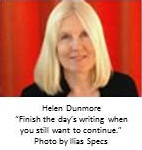You’ve heard the show business adage, “Always leave them wanting more,” meaning an entertainer should exit the stage before the audience gets bored.  By the same principle, novelist and poet Helen Dunmore said you should “finish the day’s writing when you still want to continue.”
By the same principle, novelist and poet Helen Dunmore said you should “finish the day’s writing when you still want to continue.”
Why is that? There seems to be some important facet of human nature at work here. To cite another example of this phenomenon, I used to read to my children when they were quite young, but I tried to observe them as I read to look for the early signs of boredom. In time I found I could stop reading, even in the middle of a book, and tell them that was it for the night. They’d beg me to go on, but I wouldn’t, because I knew I’d timed it right.
The human brain seems unusually good at pattern recognition and associating things together. If your brain associates a given entertainer with a feeling of boredom, you’ll be less likely to pay for a ticket next time. Similarly, if a child associates books with a feeling of interest and yearning for more, the child will likely develop a love of reading.
Let’s say it’s late at night and you’ve been writing for a while. You are at the point when you usually go to bed. You know you should call it quits, but you’re so near the end of a section, or chapter, or the whole book. Moreover, you’re in the flow, and the words are coming out well, better than usual. If you can just push it a little longer, you’ll achieve the satisfaction of completing something good.
This is the moment of decision, and you’re tempted to push on. If you do, and your fatigue causes you to get stuck for words, your brain can start associating writing with being stuck and tired. That leads to writer’s block.
However, if you save your work and turn off the computer now, your brain will associate writing with being in the flow, with feelings of interest and enthusiasm. Moreover, you’ll get the sleep you need.
It’s a funny thing, but you needn’t worry about forgetting overnight what you were going to write next. When you come back to your manuscript the next day all the memories flood back in, along with the confidence and fervor of the previous night, and pretty soon you’re in the zone again.
If you wish, before you finish for the night (even in the middle of a sentence!) you could jot down some quick notes of where the prose was headed. By some mysterious mental mechanism, your brain will be thinking subconsciously during your non-writing interval, working out better phrasing, solving plot problems, etc. The next day when you resume, you may find you have better ideas than you ended up with the night before.
Has this been your experience? Do you agree with Helen Dunmore and me, or do you adhere to a different school of thought? Leave a comment and let me know. There’s much more I want to say, but I’ll stop here, so you’ll associate feelings of fascination with—
Poseidon’s Scribe
